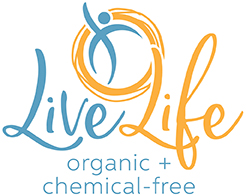
Have you done a ton of research on your own to determine how to detox your home? Have you found your health has improved? Is it possible that the products you’re buying are marketed really well as nontoxic, but are, in actuality, still creating inflammation and illness?
In this article you’ll find simple ways to know if your products are just marketed as non-toxic or are actually non-toxic.
How Can Marketing Say “Non-toxic” When the Product Is Toxic?
There are 3 main reasons that product labels and advertisements could be marketed as non-toxic, even when they’re not.
- There is no formal definition for non-toxic. Companies can use the word non-toxic as they please. For example, a product can be made of formaldehyde-free adhesives but is still toxic to human health. It can be labeled as “free and clear” and still contain harmful chemicals. Or, the product can actually be “free of harmful chemicals,” but still made with petroleum, which is also a toxin.
- Harmful chemicals are being replaced with other harmful chemicals. BPA has been replaced with BPS in an effort to make plastic healthier. PFOA and PFOS was replaced with PFAS. In both cases, the replacement chemicals are causing the same problems, affecting people’s health and the environment.
- Not all ingredients are listed on the labels. Labeling laws allow manufacturers in all industries to list some of their ingredients, not all of them.
Simple Ways to Tell if Your Products are Actually Non-toxic?
3 Basic Principles
1. It doesn’t contain plastic. Plastic is in nearly every type of item we buy – from wood (composite woods) to clothes and mattresses to food storage containers.
2. It is made of solid, 100%:
- hardwood
- glass
- metal
- ceramic
- stone
- cork
3. It’s certified from a credible organization. I’m talking about 3rd-party, credible organizations. Most times, they are non-profits. Here are a few of the top ones:
Strictest Guidelines:
EWG – ratings and certifications for personal care products, cleaners, fragrances, food
GOTS – certifications for clothes, sheets, blankets, towels, mattresses
USDA – certifications for growing food, crops, processing and manufacturing of food
2nd Strictest Guidelines:
MadeSafe – certifications for clothes, bedding, cosmetics, personal care products, cleaners
Oeko-Tex Standard 100 – certifications for clothes, sheets, towels
Additional Support
If you’d like extra support to help ensure you choose non-toxic items, or you’re afraid you’ll the choose “wrong” or toxic products without knowing it, consider hiring a healthy home coach to help you detox your home in a way that makes a big impact on your health.
Be notified about our next group coaching program by signing up for our monthly newsletter.
Are you ready to transform your home into a healthy, organic, chemical-free home?
Join our next group-coaching call.
